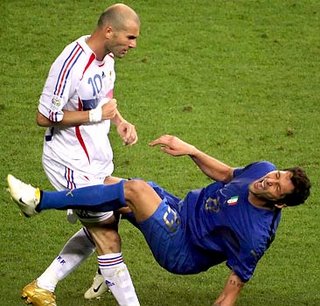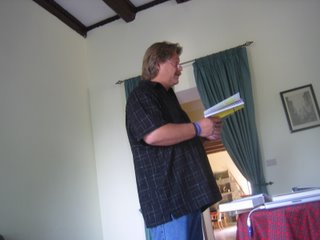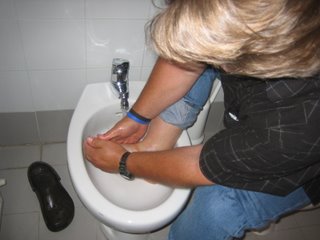Trent to Rome--Day 6
 First of all...How great was the finals of the World Cup yesterday? Having been in Italy and having watched a bit of two World Cup games featuring Italy in Italy, of course we were for Italy. Seeing a finals like this, watched by over a billion people, makes things like the Superbowl seem small! How a little country like Italy can be the champions of the world is a testimony to the greatness of the game. (That was quite a hit by Zidane, wasn't it?)
First of all...How great was the finals of the World Cup yesterday? Having been in Italy and having watched a bit of two World Cup games featuring Italy in Italy, of course we were for Italy. Seeing a finals like this, watched by over a billion people, makes things like the Superbowl seem small! How a little country like Italy can be the champions of the world is a testimony to the greatness of the game. (That was quite a hit by Zidane, wasn't it?)Monday, June 26, 2006
Description
We started the day with John Lamb’s devotional. John
 continues to develop his skills and passion for ministry. I have heard him teach for over 30 year and he has never been more insightful and on target. It has been such a joy to have John and Nancy as traveling companions.
continues to develop his skills and passion for ministry. I have heard him teach for over 30 year and he has never been more insightful and on target. It has been such a joy to have John and Nancy as traveling companions.We then hear from Jeff Fountain, Director YWAM Europe and Hope for Europe. He begins by posing a question: “We live in amazing times where we can gather from such diverse streams. The question we need to ask ourselves is do we really have hope for Europe?” That will be the theme of his presentation. “The job of the church,” Jeff says, “ is to build the kingdom while Jesus builds his church.” Because today’s is a long entry, and because Jeff’s presentation, according to his own words, is a summary of what is found in his book, Living as People of Hope, which I will review later, I will delete his presentation from this section.
Over lunch we divide into tables where each table is graced with the presence of one Focolarini. Our guest is a man named Julian. He has helped to start Focolare movements all over the world. He shares his Focolare experience with us. Thirty years ago he was struck by the fact that “these people (the Focolarini) are so different from the people I know.” Julian went on to tell wonderful stories of God’s grace. John and I ask him what it would take to start Focolare in Boulder. He takes my email address and someone will get in touch with me from Denver—Miriam Torrey, I believe was her name. It will be worth a conversation.
 After lunch we take a walk into a nearby town above the Mariapoli Center in Castelgandolfo, which is / has been the summer residence of the Pope. It is a beautiful little place looking down on an expansive lake.
After lunch we take a walk into a nearby town above the Mariapoli Center in Castelgandolfo, which is / has been the summer residence of the Pope. It is a beautiful little place looking down on an expansive lake.After lunch we hear from a geology professor named Professor Zanghi. He has been with the Focolare since 1951. To him “Jesus forsaken” was a powerful statement of life. “The cross teaches us to give without measure …without limits. We must follow Jesus to love as he loved to the point of abandonment of the father. Love is strongly linked to nothingness…not in the eastern sense but the moment I give of myself I hold nothing back.” Zanghi continues: “If you want to meet Christ, get ready to face darkness but darkness can become light…and pain can become joy. We must ‘create islands’ to show that Jesus died and rose again.”
Zanghi is then asked three questions from the audience. “How can Jesus be “Jesus forsaken” when he is seated at the right hand of the father?” He does not hesitate in giving his answers: Quoting Bonheoffer he says, “Yes Jesus is seated in glory at the right hand of the father but we comfort Jesus by comforting every person who is suffering; Matthew 25 says when we love the least of these we are ministering to Jesus himself. It’s about building a new reality.
A second question is about Mary. “Mary is an example. It’s not about devotion but a model to follow. Mary is not in competition with Jesus.”
A third question is about the inclusivity of Focolare: Zanghi answers: “God is Father of every body and loves everybody. The Old Testament says all nations will come to him. God wants all to be saved and only salvation is in Christ. Is he excluding or embracing? I would say God is embracing. Jesus said, “He is who is not against us is for us. We have to have every heart as large as God’s heart.”
Zanghi’s most memorable quote is powerful: “In heaven we find those who love, not those who talk.” Little wonder they are so emphatically passionate about living the gospel.
Throughout the rest of the day, until supper time we hear from a number of other Focolarin—Professor Vera Araujo, Alberto, Angelo, Gabri, Jonbach, etc. Some have been involved with Focolare for over 50 years! They love the “magna carta” of the Focolare…and Christianity--“That they may be one.” One presenter talks of Focolare’s foray into becoming more ecumenical. As Chiara was invited to other places, soon she began meeting with Lutheran churches. Three Lutheran pastors told her, “We want to be in touch with you. When we are together Jesus shows up.” They meet around the scriptural principle of Mark 15:34—Jesus forsaken. “Many years have passed. We understand that we have differences but we need to dialogue about this. Episcopal and Anglicans observed Catholics and Lutherans loving each other. This is how this movement has spread to other cultures.”
One comment is particularly instructive: “We are a Christian movement and have expanded to other Christian churches. As we expand we come into contact with those of other religions—Buddhists, Muslims, etc. What do we do? There are many things we can do together regardless of faith, because these people also care for the community. We each have our own prayer, theology and identity. Obviously we want people to know Jesus as Lord and Savior. We like to respect their identity and there are ways for them to see and live a better life. The “Golden Rule” is something all religions have and something we can agree on and all can live by. We don’t pretend we see Jesus in them, since he is not. This is a human working relationships and don’t know what the Holy Spirit will do. When we talk about Jesus’ presence in our midst there are many types of presence—in his Word, in the Eucharist in one another etc. We just let God be God.”
Ray remarks, “I’m 68 years old and I’ve never heard “Love your neighbor as yourself” as “love your neighbor’s church as your own church.”
Gabri comments on Together for Europe* which we’ll talk about this evening. “What does God want of us? To live out his words; the will of God, the words of God are lived out in different ways. What comes about is not just diversity but unity. A person being from Portugal is secondary to how much of the word a person is trying to live.” That is powerful!
Evening session
Together for Europe is a network of Catholic, Protestant, Orthodox and mainline churches who are figuring out how together they can work together to impact Europe with the gospel. On May 8, 2004, 10,000 believers from 175 different churches and organizations came together in Stuttgart, Germany for one day to love and serve the city in a demonstration of solidarity. Focolarini, Lucia Fronza says, “The spiritual network in Europe is becoming bigger, like a net wrapping the world because people have heard the cry and want to answer the call of Matthew 5:16 says, “Let your light shine….” So this network responded by saying, “We want to live out this verse.” We want to share this light with the world as if we were in window case for the glory of the Father. Some say this event was a turning point in our history—where people of various denominations came together. In 2007 we are planning another meeting in Stuttgart. Why? Because each movement stems from a charis…a gift of God. To witness the grace of God each person brings his / her charis to the party. We need someone to tell them that this charis is great. We need everybody’s charis, which has its own beauty and gives enrichment to the others yet keep its own identity.”
 The Together for Europe presentation is followed by a brief DVD and explanation of “Roma Amor”—a holistic evangelistic project coming up in Rome. We end up the evening at the Lambs room for more debriefing and prayer. John found that sitting in one room all day long and eating a lot of salt caused his feet "to swell up like Frodo Baggins." Fortunately there was this great footwashing sink in the bathroom.
The Together for Europe presentation is followed by a brief DVD and explanation of “Roma Amor”—a holistic evangelistic project coming up in Rome. We end up the evening at the Lambs room for more debriefing and prayer. John found that sitting in one room all day long and eating a lot of salt caused his feet "to swell up like Frodo Baggins." Fortunately there was this great footwashing sink in the bathroom.Analysis
As we were walking around town and talking with fellow pilgrims around the table it became a bit clearer that we, as evangelicals, have a different starting point than our Focolarini friends. We start with conversion. They start with conversation. Here’s my thoughts: Imagine having never read the Gospels or never been taught the meaning of the passages. To you the Gospels are uncharted waters. There is no one to tell you that some verses are more important than others…that this verse reflects the heart of God more than another. You have not been influenced by Matthew 28:18-20 or Mark 16:15. Yet you find yourself thinking, “How could I bring the love of God to the world? How could all people know that God loves them and that Jesus is God’s son?” Being that the Gospels are flat, without hill or valley, you look for clues. Then you stumble across John 13:34,35, "A new command I give you: Love one another. As I have loved you, so you must love one another. By this all men will know that you are my disciples, if you love one another." And then reading a bit further you read John 17:21-23, “that all of them may be one, Father, just as you are in me and I am in you. May they also be in us so that the world may believe that you have sent me. I have given them the glory that you gave me, that they may be one as we are one: I in them and you in me. May they be brought to complete unity to let the world know that you sent me and have loved them even as you have loved me.” Those would be your guiding verses—love and unity—the most powerful witnessing tools ever. I think this is what Chiara discovered when decided to “live the gospel.”
Application
I really enjoyed hearing Jeff Fountain’s talk this morning. He was particularly insightful in creating his construct of God—being finite or infinite…being personal or impersonal. Jeff says that which path Europe chooses will determine the future of Europe. This will be a helpful diagram for explaining the difference between the fantasy writings of C.S. Lewis and J.K. Rolling.
In my work in cities, I believe that Hope for Europe (who’s conferences I have twice attended) and Together for Europe are expressions of something God is doing in bringing churches together to better do that which they cannot do alone. Both presentations were encouraging to me.
I feel Zanghi’s quote: “In heaven we find those who love, not those who talk” needs to be a guide for my life. I find with the more I travel and tell others, the less I find myself living the truths I teach. This may be OK for a season…but not as a lifestyle. We have one teacher…his name is Jesus.


0 Comments:
Post a Comment
<< Home